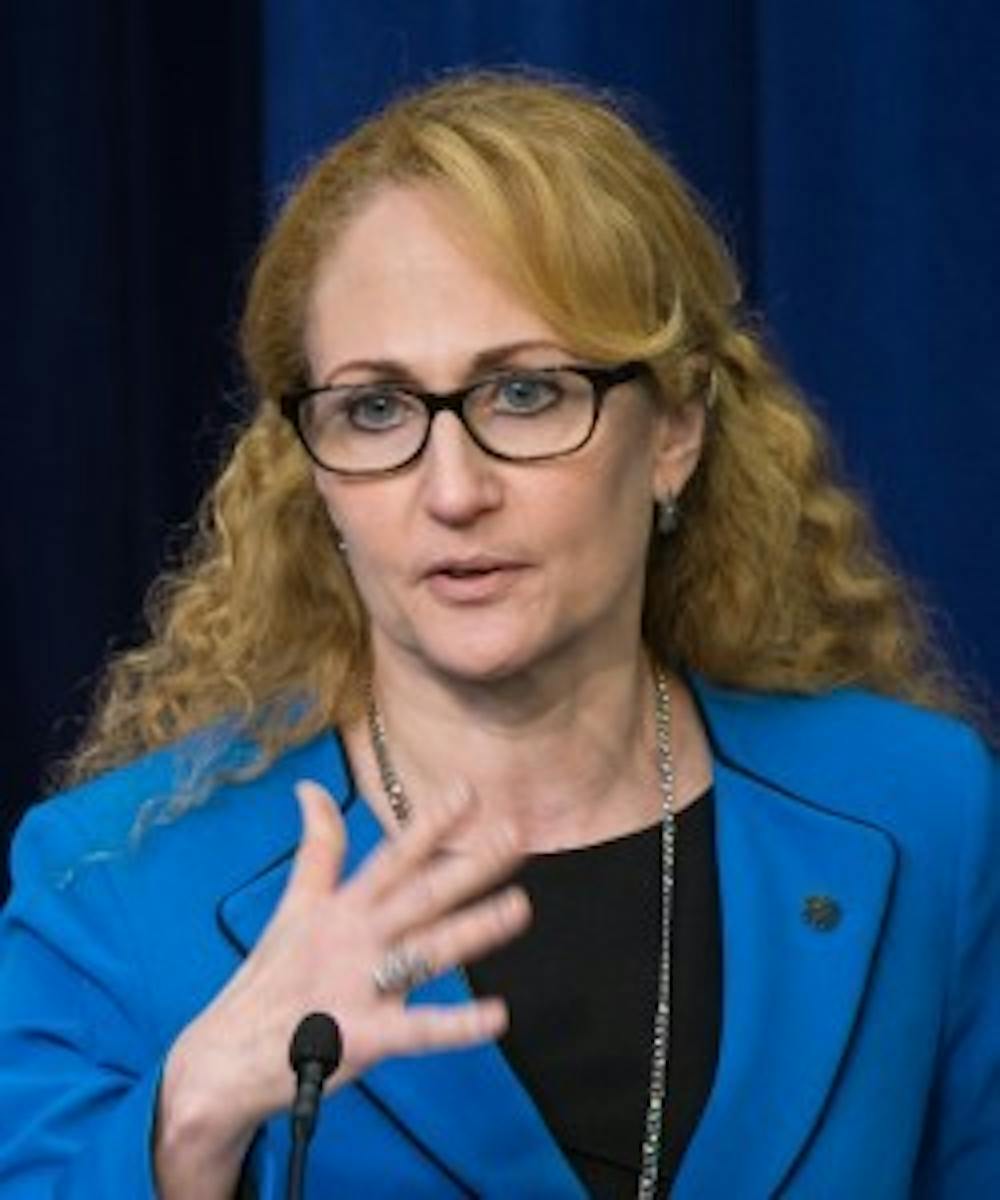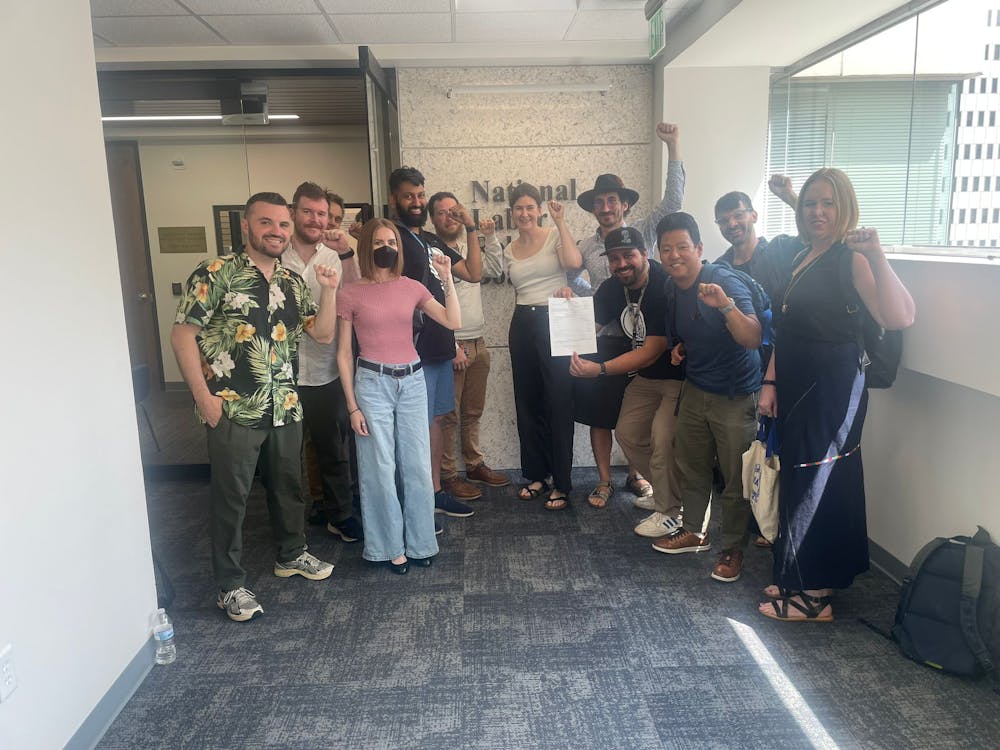Jo Handelsman, associate director for science at the White House’s Office of Science and Technology, spoke in Mason Hall on Tuesday about pervasive unconscious biases against employing women and minorities in the STEM fields.
Handelsman advises U.S. President Barack Obama on how science can inform policy. Additionally, she is an experienced researcher and proponent of women’s rights in the scientific community.
In her talk, Handelsman summarized research showing the benefit of diversity on innovation and presented studies describing how women face biases when searching for work in science and how they can transcend those biases.
She began her talk by emphasizing the importance of diversity in a work environment.
“Diversity is strength. It actually is a scientifically supported assertion,” Handelsman said. “I think particularly in America, which is the most diverse country on Earth, it’s a strength that we have to be using far better than we actually are because it is one of our tools for greatness.”
She tied diversity to the growing need for jobs in STEM fields.
“Science is critical. It is driving the greatest innovation and economic development in the nation. The jobs that are open to STEM majors aren’t being filled,” Handelsman said. “Before we reach any of the goals in adding more jobs, we have to address some of the most fundamental barriers, and one I’ll talk about today is unconscious bias.”
Handelsman also stated that although scientists see their fields as true meritocracies, they are also subject to the consequences of unconscious bias.
“There are a number of kinds of data that show we don’t have this meritocracy that we think we have,” she said.
To support her argument, Handelsman presented several well-reviewed scientificexperiments and studies on the role of bias in the hiring and treatment of female workers.
“Diversity is strength. It actually is a scientifically supported assertion.” —Jo Handelsman, White House Office of Science and Technology
One of the studies she presented looked at wage gaps between male and female workers and found that employers of all ages are susceptible to this wage gap.
“They found again that there was a [wage] gap in the 29 years old and younger evaluator group. Instead of an 18 percent gap [found in the all ages group], they found a 26 percent gap in the wages between men and women. So not only is it not getting better, there’s a little bit of evidence here that it is getting worse,” Handelsman said. “If you do the math, the accumulated loss of income turns into a very large amount of dollars.”
Handelsman also referred to multiple experiments in which an identical résumé is given to a group of employers. The only distinction between these résumés was that some of them had a female name at top and some had a male name.
“When asked whether they would hire this person or not, in every study in a four decade period, every evaluator was more likely to hire the individual if there was a male’s name on the application,” Handelsman said.
From these studies, she continuously emphasized how these results came from unconscious bias and that employers are not actively discriminating against women.
“They say they just that they want the person with the best experience and the best credentials and the sex is irrelevant in hiring and of course they say that they are fair. This suggests that this is not an explicit bias,” Handelsman said, “They are not saying ‘Women do not belong in the workplace’ or ‘Women cannot do that job,’ instead this is something much more subtle and this is something we call implicit bias or subconscious bias. So when you tell people that kind of bias, they are typically appalled. These are not racist or sexist people. These are people who are applying stereotypes. It is an unintended consequence of living in a society that we live in.”
She also noted even female employers demonstrated these sorts of unconscious biases.
“Every study shows that the evaluator’s sex was not a factor in the decision and the same was true in the matters of race. We do not see a gender difference between evaluators,” Handelsman said. “That said, this is something we all do. Women are not doing this to other women, men are not doing this to other women consciously or intentionally.”
After going through these studies, Handelsman recommended several methods to help employers avoid demonstrating unconscious biases. For example, employers could list criteria they want to see in applicants prior to reading résumés or giving out interviews.
“They found that in most cases [of listing out criteria beforehand], they were able to abolish biases if not completely, then close to it,” Handelsman said. “So that says we can do it responsibly and hold ourselves accountable if we think ahead of time, without a CV, without a candidate, male or female or any other group in front of us. We can think about the abstract fairly and say these are the criteria then we line up the candidates’ qualities to those criteria.”
Hopkins students responded positively to Handelsman’s ideas and noted how her points were important to acknowledge.
“I think it is very important to have such issues raised and made public,” Abdul Mohammed, a fifth year master’s student, said. “As you know, many biases are subconscious and we don’t really think about it, so it’s really important for us to really mention it and talk about it more in public so we can accept that this is happening.”
Tanvi Shroff, a second year graduate student, echoed this sentiment and added that she was pleased to see several men in the audience.
“I have attended a lot of these gender equity talks in our department. I take this issue pretty seriously so I was glad that Jo Handelsman was able to come and talk and give the presentation,” Shroff said. “I’m also glad that there was a lot of male audience here because it does not do much help if there were just a bunch of females at this talk.”





